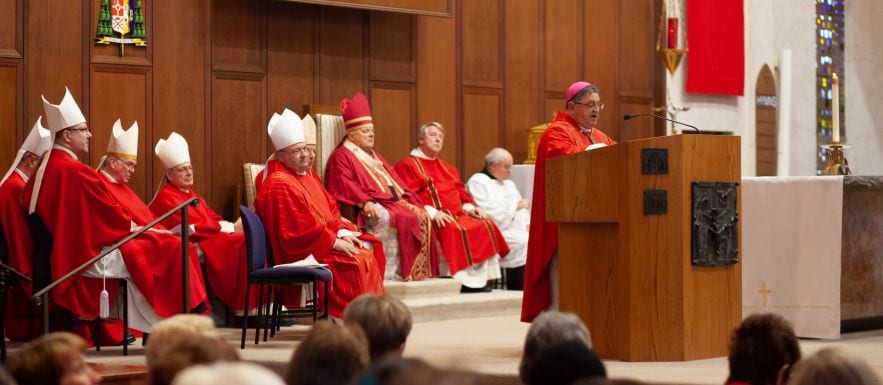By Maurice Beaulieu | Florida Catholic
Now in its 44th year in Florida, the Red Mass is a tradition that dates to 13th century France. It takes its name from the color worn by the celebrants, red for the Holy Spirit. Miami Archbishop Thomas Wenski presided at the Mass along with all of Florida’s bishops. Miami Auxiliary Bishop Enrique Delgado delivered this year’s homily.
“It’s one of the few times you can get all the bishops of Florida together,” said Jeanne Berdeaux, director of Respect Life Ministry in the Diocese of Venice, referring to the importance of Catholic Days.
In meetings with officials of the Florida bishops’ conference and their Tallahassee representatives, delegates from all seven Florida dioceses had an opportunity to discuss how laws and regulations being considered by legislators would conform to Catholic principles and affect the most vulnerable and marginalized populations in the state.
Of the three topics discussed, Florida Gov. Ron Desantis’ Bold Vision for a Brighter Future was paramount. The proposed $625 million fiscal year budget ($2.5 billion projected over the next 4 years) would benefit Florida’s Everglades conservation and water quality. Along with the restoration of Florida’s numerous water springs and alternative methods to provide clean water, ridding the shorelines of algae would be tackled in the new bill, as well.
The Bold Vision bill would secure new jobs, too. Protection for southern Florida’s marine life would guarantee investments in job creation, such as a task force assigned with algae prevention and other scientific studies aimed at purifying Florida’s rivers and beaches.
In 2018, southern Florida suffered heavily from red tide. “You can’t go to the beaches anymore,” Berdeaux said. Lee County coastlines especially, such as Ft. Myers Beach and Sanibel Island, took hard economic hits from reduced beach-goers and saw a lack of tourism from media coverage.
“It’s a very important issue,” she added, noting that the quality of enjoyment that visitors from around the world come to experience has been hindered by the harmful algae that destroys most fish and other sea life.
Florida’s focus on parental involvement in children’s lives also figured prominently in the bishops’ conference concerns. Two new bills explored in the Senate and the House would create the Family Empowerment Scholarship Program that would raise grant options for lower-income families without compromising current programs, such as the Florida Tax Credit.
Although the Florida Tax Credit has existed for over 14 years, ensuring education provisions for families-in-need, it experienced a massive reduction in corporate donations last year, even though “corporations give donations as a tax right off,” Berdeaux said. “But the donations have plateaued.” Approximately 13,000 Florida students on the waiting list for scholarships are presently in flux as a result of this cutback in contributions.
Senate Bill 7070 and House Bill 7075 would alleviate the waiting list and give considerable power to parents by allowing students to choose free or non-public schools to attend, such as Catholic schools. Florida’s Catholic schools have been applauded for their high-achieving status in reading and math for many years.
The rights of pregnant minors also were discussed at the event. Currently, parental permission is not required for abortion, only a “notification” from the clinic to the parent. Bypass measures presently allow minors to petition Florida courts to have abortions without parental knowledge. “What if they send it [the notification] to the wrong house?” Berdeaux said of one of the various ways a minor could still maneuver to obtain an abortion.
Senate Bill 1774 and House Bill 1335 would correct that by only allowing a minor to abort a pregnancy if specifically permitted by her parent. Berdeaux is confident of these bills “will be able to stand in court,” she said. The proposed laws would provide free counseling to minors without funds and would permit judicial waivers for abortion if the pregnancy was the result of force.
Andy Feuerbacher of Our Lady of the Lakes in Deltona, is a Daytona State College student who attended the event. The 19-year-old said he wanted to participate to have his voice heard.
“I do feel we made a difference,” he said. “We received overall support on all the bills.”
Several Catholic high schools participated in the Catholic Days, including Cardinal Mooney in Sarasota, Bishop Verot in Fort Myers, and Cardinal Newman in West Palm Beach.
“Taking our students to the capitol was an excellent way for them to practice social justice and to realize by getting involved they can make a difference,” said Ann Frearson, campus minister at Cardinal Newman.
Father Joseph Papes, chaplain of St. John Paul II High School in Boca Raton, has been attending Catholic Days at the Capitol for 16 or 17 years. “It was great to see the growth of the laity taking political action and voicing the message of the church to our legislatures,” he said. “We have had small groups of children in the past, but this was the time we had such numbers.” n
Aleen Stanton in West Palm Beach contributed to this report.
This story originally appeared on https://thefloridacatholic.org


